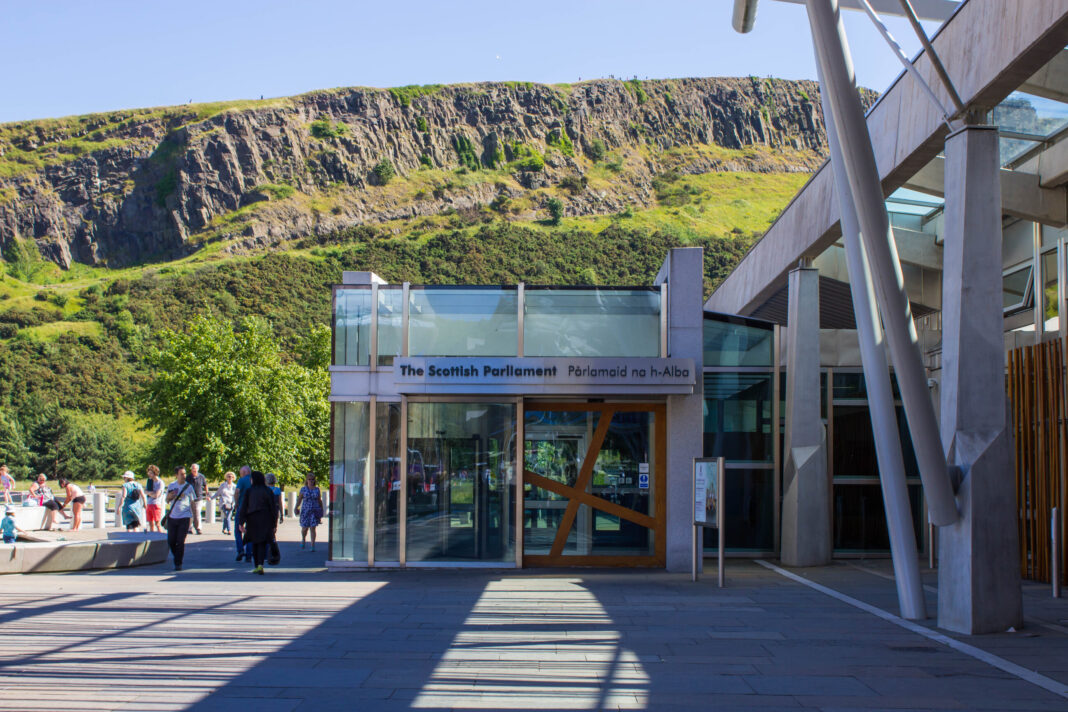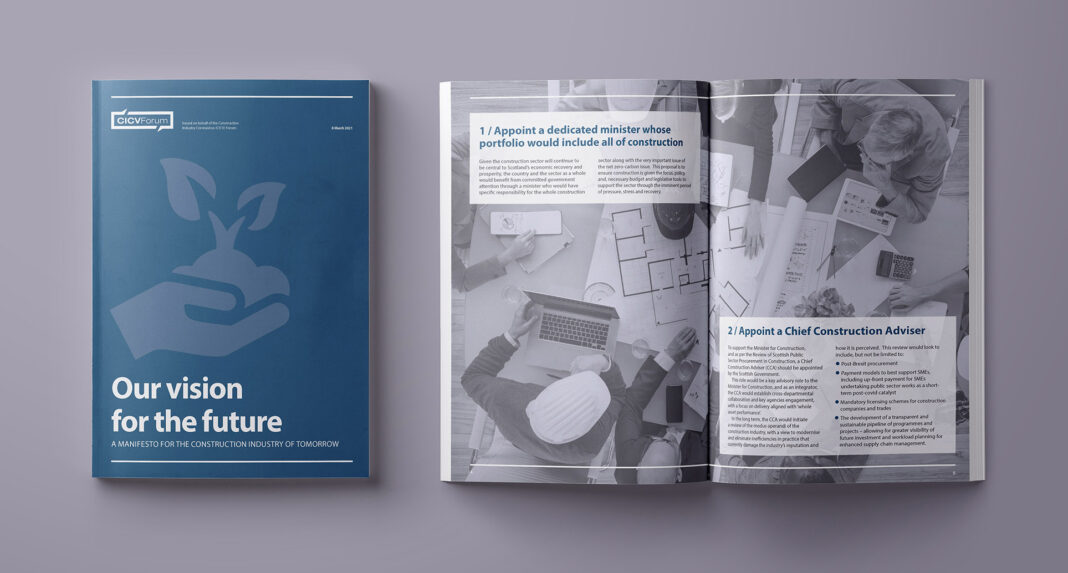
THE Scottish construction industry is eagerly waiting to discover how the outcome of the upcoming Scottish Parliament election will impact the short, medium and long-term outlook for the sector.
With the next Scottish Government primed to play a key role in the post-Covid-19 recovery period, this is perhaps the most significant election since the Scottish Parliament opened in 1999.
In a special election feature, Project Scotland asked the largest political parties in Scotland what they could offer the Scottish construction industry if elected on May 6.
Not surprisingly, the respondents stressed the importance of the sector and the vital role Scotland’s construction workforce will play in rebuilding the economy, meeting the nation’s environmental aspirations and providing the new homes required across the country.
The SNP told Project Scotland that, if re-elected, the party ‘will continue to support the construction sector through investment in public works and infrastructure projects as a way of driving recovery – and we will ensure green construction is a key part of that’.
A party spokesperson added, “We will invest over £33 billion over the next five years in our National Infrastructure Mission, supporting an estimated 45,000 jobs and providing benefits across Scottish supply chains. Under the SNP nearly 100,000 homes have been built since 2007, and we pledge to deliver another 100,000 new homes in the next decade. The plans will support 14,000 jobs a year and generate investment of £16 billion – making it the largest home building and investment programme since devolution.
“In Government, we invested £38 million into constructing the world-class V&A Museum of Design in Dundee and established a £50 million Town Centre Fund to enable local authorities to stimulate a range of investments. Just last year, we announced £30 million of new investment for regeneration to stimulate local construction across Scotland and support disadvantaged areas in the recovery. This included another £18 million for the Town Centre Fund and £12 million for Regeneration and Capital Grant Funding.
“We also established the new Place Based Investment Programme, backed with initial investment of £105 million capital in 2021-22 to support town centres, create 20-minute neighbourhoods, and stimulate community regeneration. This is on top of the ongoing Clyde Gateway project – Scotland’s biggest and most ambitious regeneration programme – and the £3 billion A9 project.
“The SNP recognises that it is just as important to invest in training people into the sector as it is to invest in the sector itself. That is why we will continue the Pathway to Apprenticeships programme, which provides work-based training and a £100 a week allowance for school leavers up to age 18. This will continue to help young people gain key skills in sectors like construction and engineering. Construction has been a priority for the SNP Government since we were first elected – and if we are re-elected it will remain firmly at the top of the agenda.”
Maurice Golden, the Scottish Conservative economy spokesman, told Project Scotland the construction industry will be the ‘beating heart’ of the recovery. He said, “The Scottish Conservatives view the construction industry as the beating heart of our economic recovery, particularly after the coronavirus pandemic. Nationalist parties want to force on Scotland another divisive independence referendum as soon as they can but the Conservatives will get the Scottish Parliament laser-focused on rebuilding Scotland, saving jobs and businesses. We will deliver the biggest social housebuilding programme since devolution and eradicate rough sleeping for good, delivering 60,000 new affordable homes. Our construction industry is worth £7.8 billion and will be the motor used to deliver these new homes. We also have ambitious plans for a ‘skills revolution’ with far more apprenticeships, as we seek to boost training and skills.
“With the construction industry employing 143,000 people in over 50,000 businesses, the industry is ripe for training our young people. We cannot have left behind a ‘lost generation’ of our young people after the pandemic. The Scottish Conservatives have always stuck up for our construction industry, just like when we asked the SNP to follow England’s lead during the second Covid wave and safely open up the industry; but the SNP refused, putting thousands of jobs at risk. The Scottish Conservatives are the only party that will always back our construction industry, through all times, both good and bad.”
Pauline McNeill, the Scottish Labour communities, local government and housing spokesperson, told us that the health of the construction industry is ‘largely dependent’ on the health of the general economy, which is why Scotland needs a parliament ‘solely focused on national recovery from Covid-19’.
She added, “Over the last year, the pandemic has left many in the construction industry with little certainty of their future in work. Looking forward, new challenges lie ahead in adapting to the impact of Brexit and working to meet climate change targets. Scottish Labour will introduce the biggest housebuilding programme of a generation which will benefit the industry, but more than that we will create a National Housing Agency that will help coordinate the skills and the create the conditions to achieve this.
“We need a strong construction industry to support the delivery of our radical plans to ensure everyone in Scotland has access to a warm, safe, affordable place to live. This includes a shift to publicly-led development of housing and a significant increase in the number of social homes being built across Scotland to end the housing crisis. It also means new and retrofit energy efficiency measures for homes. These and other procurement measures will ensure newly created jobs deliver fair work principles.
“Scottish Labour also has an ambitious plan to prevent an unemployment crisis, with stimulating the economy and creating jobs at its heart. This includes a Scottish Skills Benefit to enable paid retraining opportunities, and a Job Guarantee for young Scots or the unemployed. 5,000 apprenticeship places will be created, within a sharing scheme so that businesses in key sectors like construction can take on an apprentice together. These measures won’t risk redundancy, only creating jobs in addition to current supply. For small businesses to flourish again after restrictions ease, Labour promises the Business Restart Fund and Business Transition Fund. Only Scottish Labour is focused on solutions for recovery.”
The Scottish Liberal Democrats told Project Scotland the party will ‘put recovery first’. A spokesperson said, “At the heart of that is ensuring that everyone has a good job and a warm home to call their own. The construction sector will be critical in meeting both of those aims. Scottish Liberal Democrats persistently asked for social rent targets to be elevated, but SNP ministers didn’t budge. Building more homes for social rent would re-establish it as a long-term option for people.
“As well as recovering from the pandemic, we have ambitious proposals to accelerate action to tackle the climate emergency. Our work in opposition led to the tougher national target of a 75% emissions reduction by 2030. We have the radical and credible plans to turn that into reality, with the focus that’s needed. We will bring forward an Energy Efficiency and Zero Carbon Bill, move towards Passivhaus standards in new builds and launch a major new infrastructure programme to switch existing homes to green energy. We will establish clear standards, helping the construction industry contribute to and benefit from a green recovery.
“The government declared energy efficiency a national priority before the last election, but leaky buildings are still a persistent problem. The government’s new plan still leaves 5% of Scottish households in fuel poverty in 2040. Scottish Liberal Democrats will end fuel poverty, establish catch-up zones for communities hardest hit and invest substantially in energy-saving measures, creating thousands of green jobs in the process.
“We will conduct an urgent review to assess what needs done to bring the thousands of neglected and vacant properties back into use and support the renovations to make this happen. Safe, good quality housing is the very foundation to ensuring fair and equal opportunities for all. Scottish Liberal Democrats will get on with securing that without distraction.”
In its manifesto for the upcoming election, the Scottish Greens revealed the party will ‘push for action to increase the amount of social housing, control rents, increase security of tenure and improve management in the private sector’. The party stated at least 12,000 new social rented homes require to be built each year, and thousands more than that to meet population growth and replace older housing. The manifesto also vowed that a ‘radical programme’ of land reform can ‘transform the social, economic and environmental prospects for communities across urban and rural Scotland’. With more Green MSPs, the party hopes to give communities greater powers to shape how land is developed.
Outside politics, a number of key stakeholders from within the Scottish construction industry have also been having their say on what they’d like to see emerge following the Holyrood election. The CICV Forum has called for the appointment of a Scottish minister for construction in its first ever manifesto.
Described as an ‘unprecedented show of co-operation, commitment and collaboration’, the manifesto highlights the steps required to secure a ‘viable and sustainable’ future for the construction industry.

Acting through the Construction Industry Coronavirus (CICV) Forum, a range of trade associations, professional bodies, companies and individuals signed up to the manifesto’s proposals, which include a plea for a dedicated government minister for the construction industry, which would recognise its importance to the recovery and to the nation’s net zero aspirations.
The manifesto also proposes:
• A chief construction adviser who would support the minister and focus on delivery aligned with whole asset performance
• The development of an effective public sector maintenance and improvement programme
• The establishment of a VAT reimbursement fund for home repair and maintenance with a role for the Scottish National Infrastructure Bank
• Investment in affordable homes
• Development of the skills arena
• The introduction of a cycle network within the infrastructure investment plan
• The encouragement of conflict avoidance.
Hew Edgar, associate director of policy at the Chartered Institute of Building (CIOB), and chair of the Forum’s future planning sub-group, said, “This manifesto is a declaration of intent, emerging from the environment of collaboration and co-operation which the CICV Forum has fostered during the Covid-19 pandemic. This is the industry speaking with one voice, with an aim to benefit the future health, wealth and wellbeing of the country. In offering these proposed policy initiatives, the CICV Forum and its members demonstrate that they will continue to engage positively with the next Scottish Government, representatives in Holyrood and the wider sector to provide intelligence, best practice and advice.”

Housebuilding sector trade body Homes for Scotland (HFS) also published a manifesto, calling for politicians to unite around the need to build at least 25,000 new homes each year. HFS chief executive Nicola Barclay said, “Housing is fundamental to both the desire for inclusive growth and the human right to an adequate standard of living, yet Scotland still doesn’t have enough of the homes it needs for its citizens. This shortage has built up over decades, compounded by the global financial crisis of 2008 since which time some 90,000 fewer homes than needed have been built. Whilst we have seen some positive progress being made in recent years, there has only been a target for affordable housing. We fully recognise the importance of this but we also need to make sure that we are delivering enough homes of all tenures.”

The Scottish Property Federation (SPF) has published an ‘action plan’ ahead of the election, setting out proposals to drive investment into the property sector and help deliver a ‘sustainable and inclusive economic recovery’. 16 recommendations have been put forward, designed to tackle long-term challenges such as achieving net zero carbon targets, in addition to matters which require to be addressed quickly.
SPF highlighted Scotland’s ‘broken’ business rates system as one issue in need of ‘immediate’ action, with the pandemic ‘exacerbating structural flaws’ in the way rates are calculated. The action plan also calls for the removal of empty rates on properties that have been left vacant by the pandemic. This, the SPF claimed, would help attract investment into struggling high streets. The organisation is also proposing the establishment of a new national infrastructure agency tasked with coordinating Scotland’s shift to green infrastructure, while bringing together key agencies to ‘streamline’ planning and development.
Outgoing SPF chair Michaela Sullivan said, “The next Scottish Government will have the vital task of rebuilding the Scottish economy following over a year of severe disruption for businesses across the country. The impact on investment into the commercial property sector alone has been colossal. 2020 saw a fall in year-on-year investment in commercial property of some 50%, representing a reduction of £1bn in activity.”
The Scotland and Northern Ireland Plumbing Employers’ Federation (SNIPEF) has issued a manifesto highlighting the steps the incoming government needs to take to help create a ‘profitable and sustainable’ construction industry. The document stresses the role that the plumbing and heating industry will have in the journey to net zero, since its operatives have the skills to provide heat decarbonisation services.
Fiona Hodgson, chief executive of SNIPEF, said, “We believe this manifesto to be critical to building a resilient and sustainable construction landscape in which plumbing and heating firms can develop, compete and thrive. As a federation, we wholeheartedly support the political will for a move to rapid decarbonisation, and it is of the utmost importance that recognition is given to the vital role that the plumbing and heating sector has in this transition.

“Our member firms have played a huge part over the course of the pandemic by continuing to carry out essential work, but many have faced financial difficulties through limiting activities and keeping their workforces and the public safe.”
Catherine Thornhill, land manager for Barratt Homes is, not surprisingly, hoping the political parties will refocus their attention on housing. She said, “I’d like to see some recognition of the importance of the housebuilding industry to society, not just in terms of meeting the housing needs of the population but also the importance of the sector to the economy and providing jobs and training to young people. Remember that every home built supports four jobs. People also need support to make it onto the housing ladder, so I would like to see the reinstatement of the Help to Buy scheme in Scotland.

“Alongside this we need a commitment to the delivery of new homes – we know Homes for Scotland proposes 25,000 a year – backed by policy, to enable that promise to be delivered. Embedding this target in policy and decision making will result in a resilient housing strategy. Upfront strategic infrastructure is critical to enable housing targets to be met, so let’s have a commitment to its funding and delivery. And underlining all of this, we need leadership, direction and support in the transition to net zero – nothing is more important than that.”
Phil McDowell, regional director of Kier Regional Building north & Scotland, said, “The construction industry is pivotal to the post-Covid-19 recovery in Scotland. Greater collaboration between gGovernment, contractors, third sector organisations and local supply chain partners is vital as we look to deliver infrastructure, including new health and educational facilities as well as housing, using sustainable methods that support Scotland’s 2045 net zero ambitions. Through a defined pipeline of work from the next government, the industry has the opportunity to support local economies, provide training on green skills for local SMEs and provide enduring community benefits across the country.”









